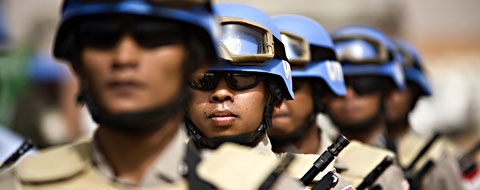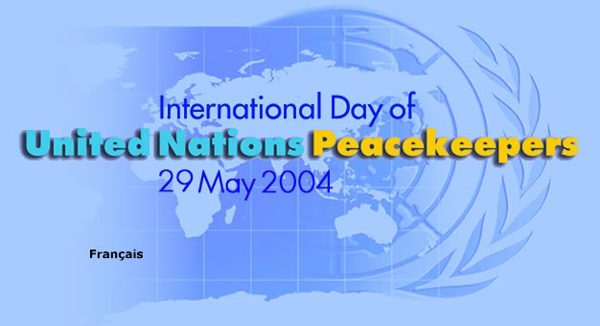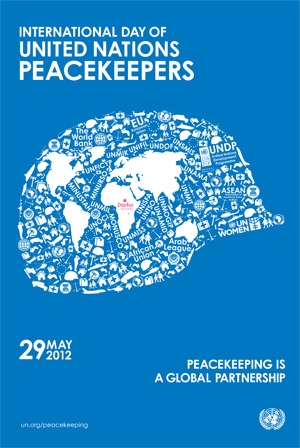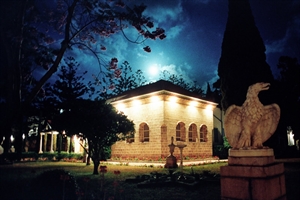International Day of United Nations Peacekeepers 2024 is on Wednesday, May 29, 2024: What power does the United Nations really have?
Wednesday, May 29, 2024 is International Day of United Nations Peacekeepers 2024. The "International Day of United Nations Peacekeepers", May 29, is "a day to pay tribute to all the men and women who have served and continue to serve in United Nations peacekeeping operations for their high level of professionalism, dedication, and courage and to honor the memory of those who have lost their lives in the cause of peace."

The "International Day of United Nations Peacekeepers", May 29, is "a day to pay tribute to all the men and women who have served and continue to serve in United Nations peacekeeping operations for their high level of professionalism, dedication, and courage and to honor the memory of those who have lost their lives in the cause of peace."

The United Nations does not technically have any administrative power as determined by the United Nations Charter and the principles of State Sovereignty, which defines that each nation has the authority to do as it pleases within its own borders. However, that definition leaves a significant amount open. For example, what defines a nation? A government? What if a government is considered illegitimate? Or another example, what happens when an issue occurs across borders? Is it still subjective to state sovereignty? People may have their own opinions on the matter but my personal opinion is in an international instance, state sovereignty does not apply because then it would be a nation able to do what it pleases across borders (i.e. pollution).
There are many misconceptions as to the United Nation's power, however. Many critics of the UN are quick to assume that the UN cannot infringe on state sovereignty and therefore has no power. These critics, however, seem to forget that states agree to be part of the UN and the UN agrees to have them as members. My argument about state sovereignty aside, member states are bound to the UN Charter by being members, risking expulsion from the organization if they do not comply.
So the UN has six main branches. When it comes to power, four are particularly important. The first is the Secretariat, which does a lot of press releases, provides information (such as global climate information or updates on an issue at hand) to member states, and otherwise helps to aid organizations like UNICEF and the UNDP that do more of the groundwork, by fostering programs that help people in the world. The second is the International Court of Justice, which admittedly is almost never used. This branch tends to settle border disputes and similar conflicts using a legal system but it should be noted that only member-states of the UN can appeal to the ICJ and all involved states must agree to participate, by so doing they agree to adhere to the decision.
Third is the Security Council, which has 15 members, five of which have the permanent seat and the "veto" power. They are the only UN body that can use the word "commands" in their resolutions. They can take actions such as economic sanctions (economic sanctions from a group of nations is always more effective), send in peacekeepers to protect refugees, and if necessary expel a nation from the UN. However, given the "veto" power, many of these resolutions are difficult to achieve and again the council reverts to passive voice that a nation does not need to adhere to.
Finally, the (arguably) most important branch is the General Assembly, which consists of every member state of the UN. This in many ways represents the UN and its powers because while the resolutions are not binding (Iraq has ignored a good amount of them), they do carry the weight of the world. Its a platform for nations to express their concerns and for nations to better communicate with each other. For example, if a resolution is passed with 190 votes out of 193 about Syria, Syria will not look very good for refusing to acknowledge it (which it does not seem to care about these days…). Most nations, however, want to maintain diplomatic relations and otherwise look appealing to the international community.
No, the United Nations cannot infringe on state sovereignty without a vote from the Security Council which yes, is rare. However, the UN serves primarily as a philanthropic organization as well as a platform for global discussion (i.e. a very important role that the UN serves is organizing conferences between NGO's - this often leads to resource sharing to help bring about more effective programs). It's about communication and diplomacy. One can argue that the UN is not important (I disagree, personally), but before doing so they should know more about what the UN does and how it does it.

why dont we leave the useless united nations and create a new actually helpful world body?
It isn't useless. On Tuesday we will have a president and a UN ambassador who don't hate the UN and won't ignore the agreements we have signed such as those prohibiting torture.
Here are some of the accomplishments of the UN:
22 November 1967
Following the six-day war in 1967, the Security Council, after lengthy negotiations, adopts resolution 242 (1967), as the basis for achieving peace in the Middle East.
12 June 1968
General Assembly approves Treaty on the Non-Proliferation of Nuclear Weapons and calls for its ratification.
4 January 1969
The International Convention on the Elimination of All Forms of Racial Discrimination comes into force.
June 1972
The first UN Environment Conference is held in Stockholm, Sweden, leading to the establishment of the UN Environment Programme (UNEP), headquartered in Nairobi.
4 November 1977
Security Council adopts mandatory arms embargo against South Africa.
May-June 1978
General Assembly convenes special session, for the first time, on disarmament.
18 December 1979
General Assembly adopts the Convention on the Elimination of All Forms of Discrimination against Women, covering political, economic, social, cultural and civic values.
1981
UN High Commissioner for Refugees is awarded the Nobel Peace Prize for the second time, for its assistance to Asian refugees.
25 November 1981
General Assembly adopts Declaration on the Elimination of All Forms of Intolerance and Discrimination Based on Religion or Belief.
10 December 1982
New UN Convention on the Law of the Sea is signed by 117 States and two entities -the largest number of signatures ever affixed to a treaty on its first day.
December 1984
Secretary-General Javier Perez de Cuellar sets up a UN office for Emergency Operations in Africa to help coordinate famine relief efforts.
10 December 1984
General Assembly adopts the Convention against Torture and Other Cruel, Inhuman or Degrading Treatment or Punishment.
September 1987
Efforts of UNEP lead to the signing of the Treaty on the Protection of the Ozone Layer -known as the Montreal Protocol -a follow-up to the 1985 Vienna Convention on the Ozone Layer.
1988
UN Peacekeeping operations awarded the Nobel Peace Prize, at the time there were seven peacekeeping or observer missions in operation.
Nobel Peace Prize awarded to UN peacekeepers in 1988, New York, Oct 88 (173115 UN/DPI/J. Isaac).
April 1989
UN Transition Assistance Group (UNTAG) is deployed throughout Namibia to monitor South Africa's withdrawal and provide electoral assistance. Elections were held in November 1989; Namibia becomes independent on 21 March 1990.
2 September 1990
Convention on the Rights of the Child comes into force.
29-30 September 1990
UNICEF convenes the World Summit for Children, attended by 71 Heads of State and Government. A Plan of Action is adopted.
31 May 1991
A cease-fire in the 16-year civil war in Angola is negotiated, then administered by the UN Angola Verification Mission (UNAVEM II).
31 December 1991
Agreement signed at UN Headquarters, through the good offices of the Secretary-General, between the Government of El Salvador and FMLN (National Liberation Front)
June 1992
The UN Conference on Environment and Development, the "Earth Summit", is held in Rio de Janeiro attended by leaders from over 100 countries, the largest intergovernmental gathering in history, resulting in Agenda 21, a plan of action for sustainable development.
1993
Eritrean independence was declared on 27 April, 1993 as a result of a referendum held with UN verification, with more than 98.5% of registered voters voting. Eritrea was subsequently admitted to membership in the United Nations and the Organization of African Unity.
1993
UN-supervised elections were held in Cambodia resulting in a new government, and the drafting of a new constitution, ending nearly 15 years of strife in the war-torn country.
23 June 1994
Elections are held in South Africa from 26 to 29 April, observed by 2,527 staff of the United Nations Observer Mission in South Africa (UNOMSA) deployed around the country. On 25 May, the Security Council lifted the arms embargo and other restrictions against South Africa. On 23 June, after 24 years, South Africa took its place once again in the General Assembly.
October 1994
Mozambique's first multi-party elections are held on 27-29 October, monitored by some 2,300 international observers.
10 September 1996
The General Assembly adopted the Comprehensive Nuclear Test-Ban Treaty. This is a turning point in the history of efforts towards nuclear disarmament and non-proliferation. The treaty was opened for signature on 24 September.

What are Peace keeping missions?
- Those missions consisted of military observers and lightly armed troops with monitoring, reporting and confidence-building roles in support of ceasefires and limited peace agreements.
With the end of the Cold War, the strategic context for UN peacekeeping dramatically changed, prompting the Organization to shift and expand its field operations from “traditional” missions involving strictly military tasks, to complex “multidimensional” enterprises designed to ensure the implementation of comprehensive peace agreements and assist in laying the foundations for sustainable peace. Today’s peacekeepers undertake a wide variety of complex tasks, from helping to build sustainable institutions of governance, to human rights monitoring, to security sector reform, to the disarmament, demobilization and reintegration of former combatants.
The nature of conflicts has also changed over the years. Originally developed as a means of dealing with inter-State conflict, UN peacekeeping has been increasingly applied to intra-State conflicts and civil wars. Although the military remain the backbone of most peacekeeping operations, the many faces of peacekeeping now include administrators and economists, police officers and legal experts, de-miners and electoral observers, human rights monitors and specialists in civil affairs and governance, humanitarian workers and experts in communications and public information.
UN peacekeeping continues to evolve, both conceptually and operationally, to meet new challenges and political realities. Faced with the rising demand for increasingly complex peace operations, the United Nations in the past few years has been overstretched and challenged as never before. The Organization has worked vigorously to strengthen its capacity to manage and sustain field operations and, thus, contribute to the most important function of the United Nations – maintaining international peace and security.
In Focus
Global Open Day for Women and Peace: Highlights
Secretary-General's
Remarks at Meeting on The Global Effort to Increase the Participation of Women in United Nations Policing in Peacekeeping Operations
Press Conference on
International Day of Peacekeepers
(28 May 2010)
International Day of
UN Peacekeepers
Latest News
18/06/2010 In Liberia, UN police officer deploys her language skills to help those in need
18/06/2010 Haiti: UN peacekeepers help to arrest 30 criminals on the run since quake
16/06/2010 Top UN envoy bids farewell to first batch of blue helmets leaving DR Congo
Year in Review 2009
Maintained by the Peace and Security Section of the Department of Public Information...



